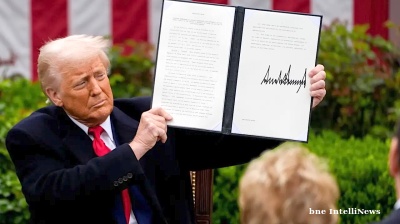The European Commission is ready to impose measures against Serbia in response to the attacks in northern Kosovo, if Belgrade does not take steps to de-escalate the situation, a spokesman for the Commission said on October 2.
Brussels is considering punitive measures against Serbia after an armed Serb gang clashed with security forces in northern Kosovo on September 24. One Kosovan police officer and three Serbs were killed.
Peter Stano, the European Commission’s lead spokesman for foreign affairs, told a daily briefing on October 4 that the European Union is prepared to consider measures against Serbia if member states consider this is justified.
“The European Union stands ready to assess measures vis-a-vis Serbia if member states decide that they have enough information, enough facts,” Stano said.
“If the EU member states decide, then we will decide the necessary measure against Serbia if the 27 member states declare that in the current situation, in the current context of this latest crisis, Serbia is not doing everything to de-escalate the situation,” he added.
The prime ministers of EU member Croatia and Albania, an aspiring member of the bloc, called on October 2 for the EU to take measures against Serbia, Croatian Radio Television reported.
Albanian Prime Minister Edi Rama condemned both the violence in northern Kosovo and the Serbian authorities’ response, specifically the decision to declare a day of national mourning.
“We have a crime, the killing of a police officer, and making heroes of those who committed it,” Rama said, reported N1.
Prime Minister of Croatia Andrej Plenkovic said the events will be investigated, after which the EU's special envoy for dialogue between Pristina and Belgrade will propose measures. Plenkovic added that he is sure measures will be adopted.
Stano emphasised that any restrictive actions would require unanimous backing from EU member states.
He highlighted the importance of a comprehensive investigation to uncover all details surrounding the events of September 24.
Stano also pointed to revelations of a “huge stash of weapons in northern Kosovo”, as well as the buildup of Serbian troops close to the border with Kosovo as “very concerning”.
The US warned on September 29 of an “unprecedented” buildup of Serbian troops and military equipment along the Kosovan border. However, the Serbian Army chief of staff said on October 2 that numbers have since been reduced.
Nato’s North Atlantic Council met on September 29 to discuss the situation in Kosovo amid increasing tensions in the north. The alliance announced that more forces were authorised for Kosovo the previous day, and the security presence will be stepped up further if needed.
The EU previously announced punitive measures against Kosovo, accusing Pristina of failing to de-escalate tensions in the Serb-dominated north of the country after clashes between protesters and law enforcers in May.
Kosovo, predominantly inhabited by ethnic Albanians, unilaterally declared independence from Serbia in 2008, following the 1998-99 conflict with Serbian forces, which ended with Nato attacks on Serbian targets.
The recent buildup in tensions has jeopardised the EU-mediated negotiations between Belgrade and Pristina aimed at enhancing their bilateral relations. These talks had already come to a standstill following the unsuccessful round of discussions on September 14.
News

Slovak PM Fico delays approval of EU’s sanctions package again, blaming Slovak opposition
Slovak populist Prime Minister Robert Fico has again delayed approval of the latest 18th round of EU sanctions against Russia, blaming his latest blocking on the opposition parties in Slovakia.
_1752601672.jpg)
Russia’s consumer spending motor runs out of fuel
A number of indicators point to the stagnation of consumer spending in Russia, which for years has been the main driver of economic growth.

China and Serbia to hold first joint military training exercise
China and Serbia will conduct their first-ever joint military training exercise later this month in northern China’s Hebei Province.

Baltic States face surge in fatal overdoses as nitazenes flood region
A powerful and little-known synthetic opioid called nitazene is fuelling a deadly drug crisis across the three Baltic States, with Estonia reporting a threefold rise in overdose deaths in recent years.




